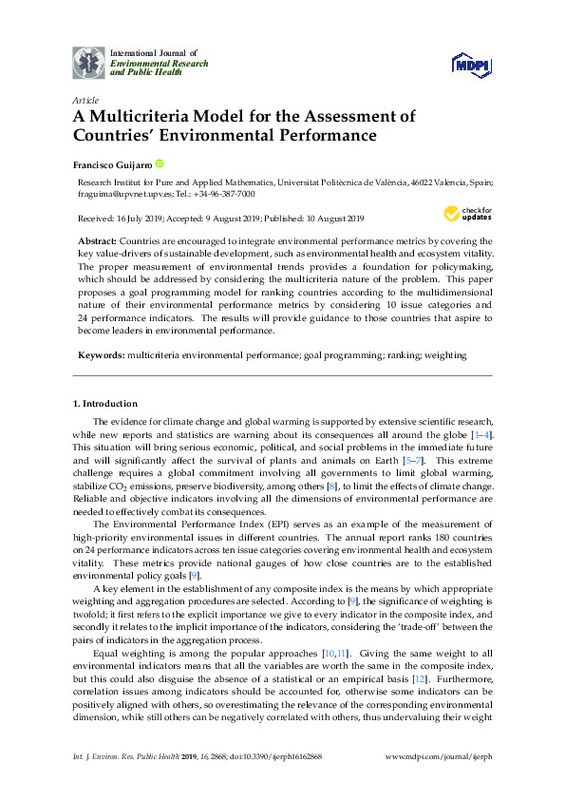Short, F. T., Kosten, S., Morgan, P. A., Malone, S., & Moore, G. E. (2016). Impacts of climate change on submerged and emergent wetland plants. Aquatic Botany, 135, 3-17. doi:10.1016/j.aquabot.2016.06.006
Lynch, A. J., Myers, B. J. E., Chu, C., Eby, L. A., Falke, J. A., Kovach, R. P., … Whitney, J. E. (2016). Climate Change Effects on North American Inland Fish Populations and Assemblages. Fisheries, 41(7), 346-361. doi:10.1080/03632415.2016.1186016
Wang, Z.-X., Hao, P., & Yao, P.-Y. (2017). Non-Linear Relationship between Economic Growth and CO2 Emissions in China: An Empirical Study Based on Panel Smooth Transition Regression Models. International Journal of Environmental Research and Public Health, 14(12), 1568. doi:10.3390/ijerph14121568
[+]
Short, F. T., Kosten, S., Morgan, P. A., Malone, S., & Moore, G. E. (2016). Impacts of climate change on submerged and emergent wetland plants. Aquatic Botany, 135, 3-17. doi:10.1016/j.aquabot.2016.06.006
Lynch, A. J., Myers, B. J. E., Chu, C., Eby, L. A., Falke, J. A., Kovach, R. P., … Whitney, J. E. (2016). Climate Change Effects on North American Inland Fish Populations and Assemblages. Fisheries, 41(7), 346-361. doi:10.1080/03632415.2016.1186016
Wang, Z.-X., Hao, P., & Yao, P.-Y. (2017). Non-Linear Relationship between Economic Growth and CO2 Emissions in China: An Empirical Study Based on Panel Smooth Transition Regression Models. International Journal of Environmental Research and Public Health, 14(12), 1568. doi:10.3390/ijerph14121568
Greco, S., Ishizaka, A., Tasiou, M., & Torrisi, G. (2018). On the Methodological Framework of Composite Indices: A Review of the Issues of Weighting, Aggregation, and Robustness. Social Indicators Research, 141(1), 61-94. doi:10.1007/s11205-017-1832-9
Biggeri, M., Clark, D. A., Ferrannini, A., & Mauro, V. (2019). Tracking the SDGs in an ‘integrated’ manner: A proposal for a new index to capture synergies and trade-offs between and within goals. World Development, 122, 628-647. doi:10.1016/j.worlddev.2019.05.022
Munda, G., & Nardo, M. (2009). Noncompensatory/nonlinear composite indicators for ranking countries: a defensible setting. Applied Economics, 41(12), 1513-1523. doi:10.1080/00036840601019364
Munda, G. (2011). Choosing Aggregation Rules for Composite Indicators. Social Indicators Research, 109(3), 337-354. doi:10.1007/s11205-011-9911-9
Ding, Y., Fu, Y., Lai, K. K., & John Leung, W. K. (2017). Using Ranked Weights and Acceptability Analysis to Construct Composite Indicators: A Case Study of Regional Sustainable Society Index. Social Indicators Research, 139(3), 871-885. doi:10.1007/s11205-017-1765-3
Zhou, P., Ang, B. W., & Poh, K. L. (2007). A mathematical programming approach to constructing composite indicators. Ecological Economics, 62(2), 291-297. doi:10.1016/j.ecolecon.2006.12.020
Charnes, A., Cooper, W. W., & Rhodes, E. (1978). Measuring the efficiency of decision making units. European Journal of Operational Research, 2(6), 429-444. doi:10.1016/0377-2217(78)90138-8
Zhou, L., Tokos, H., Krajnc, D., & Yang, Y. (2012). Sustainability performance evaluation in industry by composite sustainability index. Clean Technologies and Environmental Policy, 14(5), 789-803. doi:10.1007/s10098-012-0454-9
García, F., Guijarro, F., & Moya, I. (2010). A goal programming approach to estimating performance weights for ranking firms. Computers & Operations Research, 37(9), 1597-1609. doi:10.1016/j.cor.2009.11.018
García, F., Guijarro, F., & Moya, I. (2010). Ranking Spanish savings banks: A multicriteria approach. Mathematical and Computer Modelling, 52(7-8), 1058-1065. doi:10.1016/j.mcm.2010.02.015
Juwana, I., Muttil, N., & Perera, B. J. C. (2012). Indicator-based water sustainability assessment — A review. Science of The Total Environment, 438, 357-371. doi:10.1016/j.scitotenv.2012.08.093
Wiréhn, L., Danielsson, Å., & Neset, T.-S. S. (2015). Assessment of composite index methods for agricultural vulnerability to climate change. Journal of Environmental Management, 156, 70-80. doi:10.1016/j.jenvman.2015.03.020
Charnes, A., Cooper, W. W., & Ferguson, R. O. (1955). Optimal Estimation of Executive Compensation by Linear Programming. Management Science, 1(2), 138-151. doi:10.1287/mnsc.1.2.138
Tamiz, M., Jones, D., & Romero, C. (1998). Goal programming for decision making: An overview of the current state-of-the-art. European Journal of Operational Research, 111(3), 569-581. doi:10.1016/s0377-2217(97)00317-2
Linares, P. (2002). Aggregation of preferences in an environmental economics context: a goal-programming approach. Omega, 30(2), 89-95. doi:10.1016/s0305-0483(01)00059-7
Romero, C. (2001). Extended lexicographic goal programming: a unifying approach. Omega, 29(1), 63-71. doi:10.1016/s0305-0483(00)00026-8
Dunlap, R. E., & Mertig, A. G. (1995). Global Concern for the Environment: Is Affluence a Prerequisite? Journal of Social Issues, 51(4), 121-137. doi:10.1111/j.1540-4560.1995.tb01351.x
[-]









